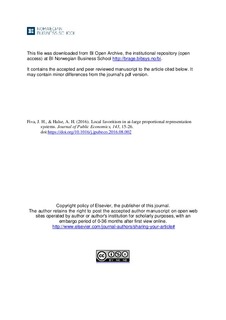Local favoritism in at-large proportional representation systems
Journal article, Peer reviewed
Accepted version
Permanent lenke
http://hdl.handle.net/11250/2588017Utgivelsesdato
2016Metadata
Vis full innførselSamlinger
- Publikasjoner fra CRIStin - BI [1015]
- Scientific articles [2181]
Sammendrag
Pork barrel spending is typically attributed to the strategic behavior of political elites hoping to be electorally rewarded by voters residing in their districts. Such behavior is expected to depend on the incentives imposed by the electoral system. We estimate the causal effect of local representation in a closed-list proportional representation system where individual candidates have no clear electoral incentive to favor their hometown. Using data from Norwegian regional governments, we still find a hometown bias. We document that municipalities with a representative on the regional council from the same party as the regional governor tend to obtain more funding for local investments. Citizens also tend to vote more often for parties whose gubernatorial candidate is from their own hometown, consistent with expectations of particularistic benefits. A possible explanation is that regional council members are often recruited from local politics and remain loyal to their roots. We find no evidence that regional council experience affects politicians' future career prospects at the local level.

